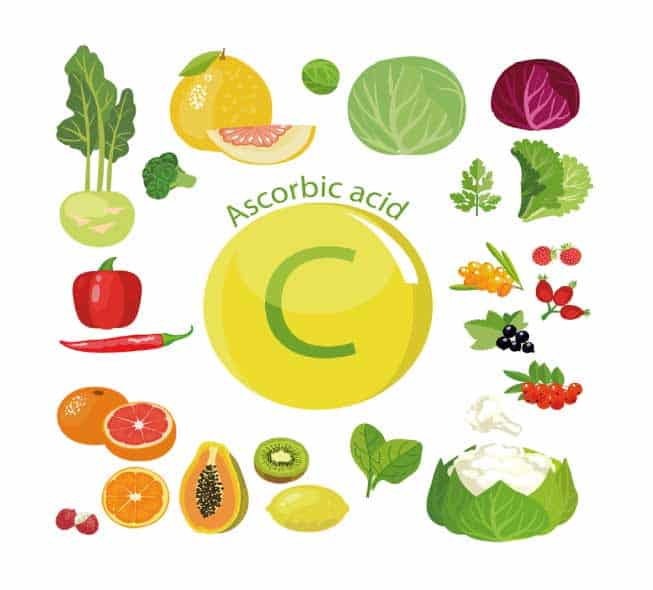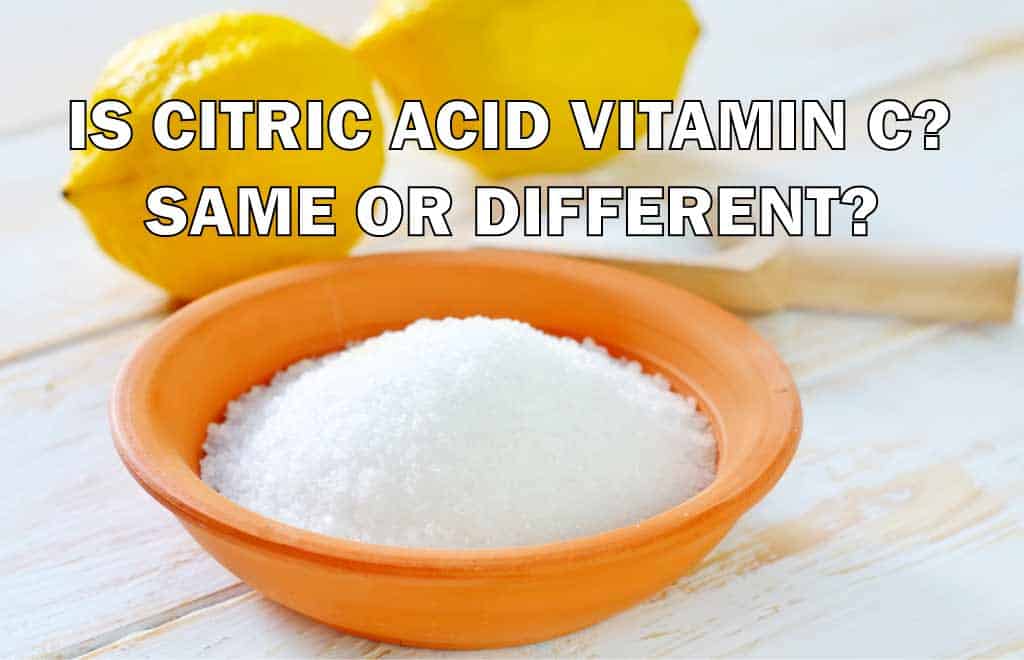When people hear vitamin C, they picture citric fruits like lemon, orange, and lime, among other fruits and vegetables. And we all know these fruits and vegetables contain vitamin C and also citric acid which is partly responsible for their sourness. So, it’s not uncommon to think that vitamin C and citric acid are the same. But, is citric acid vitamin C?
Citric acid and vitamin C are two very different compounds. Vitamin C is alternatively known as ascorbic acid, and it isn’t interchangeable with citric acid. Both of these have very different functions. Citric acid is organic, and you don’t need to supplement it in your diet. Ascorbic acid is a vitamin, and it’s essential for your bodily mechanisms.
There are many other things to learn about the difference between the two acids. Vitamin C is an essential element that is highly beneficial for good health. Between the two, citric acid is more acidic than vitamin C. In this article, you will learn about the main differences between citric acid and vitamin C. So, keep reading till the end.
Vitamin C and Citric Acid – What Are They?
It’s easy to confuse ascorbic acid with citric because their sources are very similar, and they also have similar names. But citric acid is an antioxidant, while ascorbic acid is simply a vitamin.
Before we dive deep into their differences let’s first learn more about what these compounds are.
Ascorbic Acid
A human body is incapable of making vitamin C on its own. It’s also significant for your health. The experts from the Food and Nutrition Board suggest a consumption somewhere between 75 to 120 milligrams every day, the upper limit being 2,000 milligrams.
Vitamin C is essential for the repair and development of your body. It also plays an active role in collagen formation, iron absorption, and a properly functioning immune system. You need vitamin C for the maintenance of your bones, teeth, and cartilage. It also has antioxidant properties, so you’ll get protection from free radicals that cause inflammation.
Excess Vitamin C leaves the body through excretion, so you won’t necessarily overdose on it. But it’s a good idea not to go above the upper limit. You can find vitamin C in different fruits and vegetables like broccoli, kiwi, tomato juice, red cabbage, and pureed vegetables and fruits.

Ascorbic acids aren’t as acidic as citric. It’s a food additive that developers in the food industry use to add flavors and reduce glucose by a multistep procedure. It gives food vibrant colors and prevents microbial growth. So, ascorbic acids are prevalent in different spreads, sauces, and jellies.
Besides, it also has a significant role in baking bread because it provides yeast overgrowth essential for the bread to fluff and have a fine texture. Between ascorbic acid and citric acid, ascorbic acid is more versatile.
Citric Acid
Berries have a high amount of citric acid. It’s an organic acid that you can find in several fruits and vegetables. Lemons and lime contain the highest percentage of citric acid. Between citric acid and vitamin C, citric acid is more antioxidant because it has less oxygen and one extra oxygen atom.
The value of citric acid is its citrus flavor and tartness. It has little nutritional value, but it boosts energy. It also works best to break down kidney stones and prevent new ones from developing and forming.
Commercially, food industries use this compound to enhance the tart flavor of food. But citric acid can also remove excess aluminum from your body. Citric acid has many substitutes, which aren’t the same as ascorbic acid.
A human body can produce citric acid on its own, which is called the Krebs cycle. Although it’s organic, the product suppliers use in the food industry is artificial and produced synthetically from sugar.
Citric acid works best to increase the pH or acidity of the food. It would take a lot more ascorbic acid to boost the pH of food products than you’d need citric acid. It’s also used in soft drinks. Drinking too much soda might soften your teeth.
The Difference Between Citric Acid and Ascorbic Acid
Vitamin C and citric acid are similar compounds but not the same. You can find both of these compounds in citrus fruits. Besides, they both have antimicrobial and antioxidant properties. Chemical structure-wise, citric acid has one more oxygen molecule than vitamin C.
Ascorbic acid and citric acid have very different functions. Vitamin C is an essential nutrient that you need daily. Ascorbic acid links with tissue repairing, disease prevention, and protection from inflammation, among other things. But these are not prominent effects of citric acid. We need vitamin C to function through all stages of our lives.
Citric acid has more commercial uses than health benefits. In addition to how suppliers use it in the food industry, citric acid also frequents the cosmetic industry, pharmaceuticals, and cleaning products. In a nutshell, citric acid and vitamin C differ by:
- Chemical structure
- Nutritional facts
- Commercial use
- The requirement in the human body
- Acidity and its nature
Vitamin C is a widespread compound, at least in the case of plants. It also plays a vital role in reducing the photosynthesis stress, which citric acid does not contribute to. So, is citric acid vitamin C? You should know by now that it is not.
Foods That Contain Vitamin C but No Citric Acid
As I’ve mentioned before, ascorbic acids are versatile, and there are several forms of them. You’ll find it in all fruits and vegetables in trace amounts. Here are some foods that don’t have citric acid:
- Strawberries or other kinds of berries
- Tomatoes
- Cantaloupes
- Mangoes
- Potatoes
- Leafy greens
- Kiwis
- Peppers
You can also take vitamin C supplements. Most organisms can manufacture vitamin C on their own, which isn’t possible for human beings. So, it is imperative to take vitamin C by diet. Citrus fruits are also sources of high Vitamin C percentage. But you can consume vitamin C from tomatoes and other pureed vegetables instead of citrus fruits.
Citric acid isn’t entirely bad for your health, but consuming it too much will not be the best idea for your oral health. As it’s a relatively strong acidic compound, it might also irritate your stomach if you eat foods with high amounts of it (like pure lemon juice).
Can You Substitute Citric Acid for Vitamin C?
According to nutrition experts, you can’t substitute citric acid for vitamin C. Ascorbic acid is a natural vitamin and antioxidant you can obtain from food. Citric acid will not function the same way as vitamin C supplements in your body. But it can, however, substitute ascorbic acid commercially to some extent.
Citric acid is an alkalizing agent, meaning it reduces the acidity of a body. You can’t use vitamin C if you want to use it to substitute citric acid in a recipe. If citric acid aims to lower the pH in the recipe, using vitamin C supplements will not be effective.
Because citric acid isn’t vitamin C, taking in too much citrus food in hopes of consuming a high level of vitamin C isn’t the best idea. The next time you go grocery shopping and buy some orange juice, it’s a good idea to study the label and learn about the nutritional facts. The best thing to do is to aim for food and drinks with high levels of vitamin C.
Conclusion
To wrap it up, is citric acid vitamin C? No, it’s not. You can’t rely on citric acid alone to provide you with the benefits that only vitamin C can. They are both important and have individual uses. But, based on importance for the human body alone, vitamin C is a tad bit more important.
So, ascorbic acid is not a suitable substitute for the essential vitamin C.

